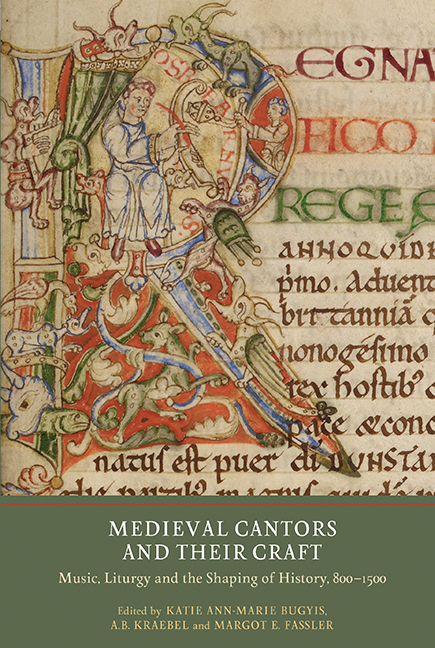Book contents
- Frontmatter
- Dedication
- Contents
- List of Illustrations
- Contributors
- Acknowledgments
- Abbreviations
- Miscellaneous Frontmatter
- Introduction
- PART I The Carolingian Period
- 1 Historia: Some Lexicographical Considerations
- 2 Liturgy and History in the Early Middle Ages
- 3 Notker Bibliothecarius
- 4 Singing History: Chant in Ekkehard IV's Casus sancti Galli
- PART II The Eleventh Century
- PART III England in the Twelfth Century
- PART IV On the Continent: Five Case Studies
- Index of Manuscripts
- General Index
- Miscellaneous Endmatter
4 - Singing History: Chant in Ekkehard IV's Casus sancti Galli
from PART I - The Carolingian Period
Published online by Cambridge University Press: 25 October 2017
- Frontmatter
- Dedication
- Contents
- List of Illustrations
- Contributors
- Acknowledgments
- Abbreviations
- Miscellaneous Frontmatter
- Introduction
- PART I The Carolingian Period
- 1 Historia: Some Lexicographical Considerations
- 2 Liturgy and History in the Early Middle Ages
- 3 Notker Bibliothecarius
- 4 Singing History: Chant in Ekkehard IV's Casus sancti Galli
- PART II The Eleventh Century
- PART III England in the Twelfth Century
- PART IV On the Continent: Five Case Studies
- Index of Manuscripts
- General Index
- Miscellaneous Endmatter
Summary
The collected writings of the monk Ekkehard IV of Sankt Gallen (c. 980–c. 1060) reveal a medieval polymath at work. Among his opera omnia are two series of versified ‘blessings’ and two sets of poetic inscriptions for wall paintings. His lifelong literary activities also include scores of epitaphs, ‘carmina varia’, translations and paraphrases, a guide for writing and hundreds of glosses. Moreover, in addition to a group of office antiphons and responsories, several non-liturgical Latin songs, proper tropes and a revised saint's vita seem likely to be his work.
It is, of course, Ekkehard's monastic history – the Continuatio casuum sancti Galli (c. 1050) – that has garnered him the greatest attention in scholarship of the last two centuries and helped to secure his legacy as a chronicler. For musicologists and liturgical historians, the rich discussion of ecclesiastical chant in Ekkehard's Casus sancti Galli is one of the great sources on early medieval musical practice, and his approximately sixty references to liturgical song in the Casus are unparalleled in medieval documents in terms of the number and scope of named chant composers and compositions, and as regards how musical detail is enlisted in the narrative.
As Margot Fassler has shown, for medieval historians, liturgy often ‘formed the framework for historical understanding’, and this framework is evident in a myriad of ways. Furthermore, because liturgy was the purview of cantors in particular, it is not uncommon to find that historians were often cantors, and vice versa. Certainly in the case of Ekkehard, it is clear that his musical-liturgical knowledge very much informed how he viewed history. Thus, in this chapter, rather than treat Ekkehard's activities as historian and musician separately, I will explore how he merges the perspectives of chronicler and cantor by analysing a key moment in an episode found in Chapters 51–56 in the Casus. I will propose, moreover, that in addition to aspects of the liturgy providing a natural underpinning for how Ekkehard writes history, he describes sung acts and cites specific chants as an effective means of shaping his narrative and telling his story.
- Type
- Chapter
- Information
- Medieval Cantors and their CraftMusic, Liturgy and the Shaping of History, 800-1500, pp. 59 - 88Publisher: Boydell & BrewerPrint publication year: 2017



